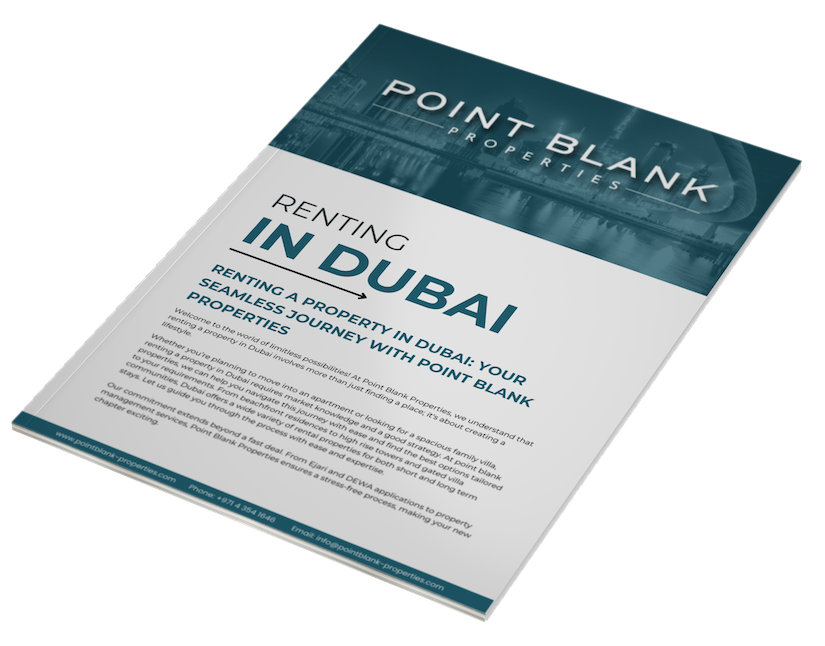Tenant's Guide
Your Guide to Renting a Property
If you’re looking to rent a property, we’re here to make it easier than ever. At Point Blank Properties, we know that renting shouldn’t feel like a maze of paperwork and unknowns. This guide is designed to walk you through every step, so you can go from search to signed lease with total confidence. Whether you’re new to Dubai or simply new to renting, we make sure you’re informed, prepared, and ready to find a place you’ll love.
Download Your Free Tenants Guide
Whether you are someone who knows about UAE or just moved to UAE, our detailed guide provides valuable insights and expert advice to help you start your journey towards renting the perfect home.

The Steps to Renting Your New Home
Renting a property in Dubai can be a smooth and straightforward process when you know what to expect. This guide covers every step, from setting your budget and viewing potential homes to signing the lease and moving in. Whether you’re new to the city or a long-time resident, follow our tips to make your renting experience as seamless and enjoyable as possible.
Step 1: Determine Your Budget and Requirements
Begin by deciding on your budget and listing your must-have features: location, number of bedrooms, amenities, and any other specific preferences. Our team can assist you in finding properties that match your needs and budget.
Step 2: Search for Properties
Browse our listings on the website to explore available properties. If you need personalised assistance, our agents are here to provide options tailored to your criteria and guide you through the best choices.
Step 3: Schedule Property Viewings
Once you’ve shortlisted a few properties, schedule viewings with our agents. During the viewings, take note of the property’s condition, amenities, and any questions you might have for the landlord or management.
Step 4: Make an Offer and Negotiate Terms
If you’ve found the right property, our agent will help you make an offer and negotiate terms, such as rental price, payment schedule, maintenance agreements, and any additional conditions.
Step 5: Prepare Documentation
For the rental process in Dubai, you’ll need: Passport copy, UAE residence visa (if applicable), Emirates ID (for residents), Proof of income or employment letter. Our team can guide you on the exact requirements for each property.
Step 6: Sign the Tenancy Agreement
Review the tenancy contract carefully. This contract outlines the rental terms, duration, payment schedule, maintenance responsibilities, and any other agreements between you and the landlord. Once satisfied, both parties will sign the agreement, making it legally binding.
Step 7: Make Initial Payments
Typically, you’ll need to provide: Security deposit (usually 5% of the annual rent), First rent payment (depending on the payment terms agreed upon, often one or more post-dated cheques for future payments), Agency fee (typically 5% of the annual rent). Our agents will help ensure all payments are documented for security and clarity.
Step 8: Register Your Tenancy with Ejari
Dubai requires all tenancy contracts to be registered with Ejari, a government system for regulating rental contracts. Our team can assist you with this process to make it quick and hassle-free.
Step 9: Move In
Coordinate with the landlord or property manager to arrange your move-in date. Ensure utilities like DEWA (Dubai Electricity and Water Authority) and internet are set up for your new home.
Step 10: Know Your Tenant Rights and Responsibilities
Familiarise yourself with your rights and responsibilities as a tenant, including maintenance protocols, rent renewal, and termination processes. Our agents are here to answer any questions and ensure you have a smooth rental experience.
What you need
Personal documents — To rent a property in Dubai on a long term basis you will need your passport, residency visa, and Emirates ID. If you are not a UAE resident and want to lease for a temporary period, you can choose a short term rental or holiday home – in this case, you will not be asked for any proof of residency.
Finances — Before diving into your search, you should be aware of the costs involved in the property rental process. You will be asked to provide a security deposit, which is usually 5% of your annual rent for unfurnished properties or 10% of your rent if the home is furnished – this percentage may vary depending on the agency. The deposit will be refunded to you at the end of your tenancy. You should also consider the agent fee if you choose to work with an agency, which is typically 5% of your rental value.
Dubai rent is typically annual and paid through post dated cheques, so a UAE bank account and a chequebook are necessary. Depending on the initial agreement with your landlord, you will be asked to pay through one or more cheques – a higher number of cheques is often linked to a higher overall rent price compared to a single payment. Keep in mind that your first rent will be requested in advance, ideally dated a few days before your move in.
Find a good agent — Once you have your budget and documents in order, you can begin the rental process. At this point we recommend reaching out to a real estate agent for personalised assistance and advice throughout the journey. At point blank properties, our leasing and holiday rental consultants are well known for providing ongoing support and professional guidance, ensuring a smooth process and an enjoyable stay in your rental property.
If you are still unsure about where to rent, our property consultants can help – they specialise in Dubai’s popular areas and will assist you with the types of properties available, information about the amenities and useful insights about the different locations in the city.
Timeline
We usually advise tenants to start their search for rental properties about one to two months before moving in – searching with too much time in advance can cause unrealistic expectations as Dubai has a dynamic real estate market and listings tend to go fast.
You do not have to be a Dubai resident to own and rent out a property – if this is your case, you can provide a copy of your passport as your identification.
Documentation
Once you find your new rental property, you will move on to the documentation to make it official – and remember, we will be there to assist you every step of the way.
Tenancy contract — Before signing this agreement, it's important to go through it with your agent to raise any questions or concerns that you may have. After you have understood the terms, the contract will be signed by you and your landlord. You will both keep a copy of this document.
Cheques — As a next step, make sure you have the agreed number of cheques with you along with the security deposit – UAE banks usually take 2-5 working days to initiate cheques upon request. Once you have them, your agent will hand them over to your landlord and provide you with receipts.
Register your Ejari — All rental contracts in Dubai must be recorded in the Ejari system to legalise the relationship between the landlord and tenant. For this step, you will be asked to go to an Ejari centre with your tenancy contract and Emirates ID. The cost of the Ejari depends on where you apply for it, usually ranging around AED 200. If you decide to go with a short term rental, this step will not be required.
Activate your DEWA — Upon registering your Ejari, you will get a link to activate your electricity and water services. You will be asked for a security deposit of AED 2,000 – or AED 4,000 for villas – and the services will be active within 24 hours. This step is not necessary for short term leasing, as the services will already be active upon your arrival.
The answer depends on many aspects like your timeframe, documentation, and whether or not you're being supported by a reputable real estate agency. At Point Blank Properties, we have successfully closed many rentals within 24 and 48 hours, but keep in mind that the amount of time relies on your specific case as well as market conditions. Even if we help you secure your rental in one or two days, it’s important to mention that the quickest possible move in date will be at least five days from the signing of the contract – this will give you enough time to register your Ejari, activate the DEWA services, and get your moving permits.
Moving permit — Finally, request permission to move in! This is usually done on the developer’s website and it takes a few minutes. Our customer service team will send you the link to this process – make sure you have your Ejari certificate and Emirates ID on hand to include in the application. This takes around 24 hours to approve and only applies to long term rentals.
Why Point Blank Properties
While most agents see the signing of the tenancy contract as the end of their job, we see it as the beginning of a long lasting relationship. At Point Blank Properties, we pride ourselves on giving you complete, ongoing services as opposed to a fast deal.
From taking care of the Ejari and DEWA applications to offering property management services and ensuring the contractual agreements are always accomplished, you can trust that our team of real estate professionals will always be by your side. Our goal is to take the stress off the process so you can enjoy the excitement of this new chapter.
Ready to begin your rental process confidently? Get in touch with our leasing consultants for long term tenancies – if you are looking for a short term rental or holiday home, find our dedicated team here.
Tenant FAQs: Renting Made Simple
Rent is often paid with post-dated cheques, and payment terms are usually quarterly, bi-annually, or yearly. We’ll help you understand the payment schedule for your property and clarify any terms before you sign.
Yes, all tenancy contracts in Dubai must be registered with Ejari to be valid. This government system protects both tenant and landlord rights. We’ll assist you with the Ejari registration so you’re fully compliant.
Besides rent, you may need to budget for a security deposit (usually 5% of the annual rent), an agency fee (also around 5%), and Ejari registration fees. You’ll also need to set up utilities like DEWA (Dubai Electricity and Water Authority) and internet.
In most cases, landlords are responsible for major repairs, while tenants handle minor maintenance. However, terms can vary by lease, so we’ll ensure you know exactly what’s covered before you sign.
Most rental contracts in Dubai are for one year, with the option to renew. Some landlords may offer flexibility, but a one-year lease is the standard.
Breaking a lease early usually involves penalties, typically equal to one to two months’ rent, depending on the terms. If there’s any chance you may need flexibility, let us know upfront, and we’ll work to negotiate terms that suit you.
Tenants are typically required to give 90 days’ notice before the end of the lease if they don’t plan to renew. Be sure to review the exact notice period in your contract.
If the property is sold, your tenancy contract is still valid, and the new owner must honor its terms. You’re protected by the Dubai rental laws, and we’ll guide you through any changes.

